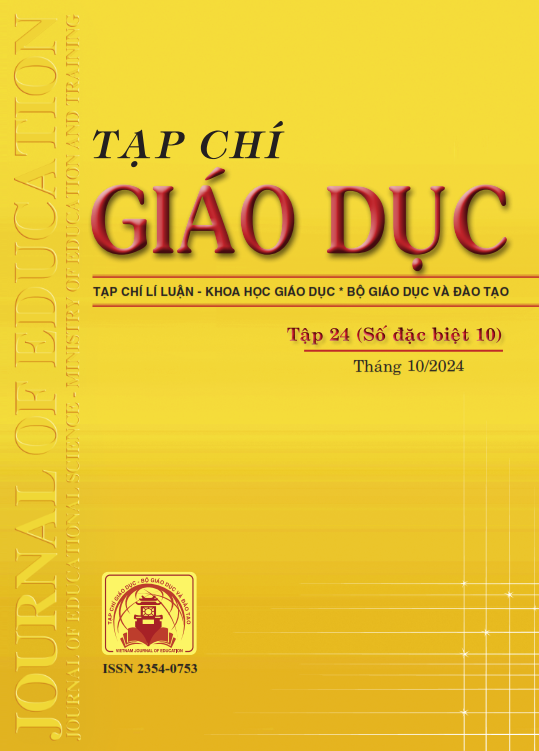Xây dựng và sử dụng thang đánh giá năng lực hợp tác của học sinh trong dạy học chuyên đề “Trường hấp dẫn” (Chuyên đề học tập Vật lí 11)
Tóm tắt
Collaboration is one of the basic competencies that need to be formed and developed for students in the context of current educational innovation. However, the accurate assessment of this competency is still facing many difficulties due to limitations in assessment methods and tools. This study presents the construction and use of a scale to assess students' collaboration competency in teaching the topic “Gravitational Field” (Physics 11). The assessment scale is built on the basis of theory and methods of assessing general competency and is implemented in experimental teaching. The results show that the built assessment scale allows quantitative assessment of collaboration competency and monitoring of student progress. The percentage of students classified as Good in collaboration competency increased from 25% to 62,5% after participating in the study, showing a clear improvement in students' competence to work in groups and interact. The assessment scale tool not only supports teachers in assessment but also contributes to improving the quality of comprehensive education, meeting the requirements of the 2018 General Education Program.
Tài liệu tham khảo
Boyatzis, R. E. (1982). The Competent Manager: A Model for Effective Performance. John Wiley & Sons.
Bộ GD-ĐT (2018). Chương trình giáo dục phổ thông - Chương trình tổng thể (ban hành kèm theo Thông tư số 32/2018/TT-BGDĐT ngày 26/12/2018 của Bộ trưởng Bộ GD-ĐT).
Gillies, R. M. (2007). Cooperative Learning: Integrating Theory and Practice. SAGE Publications.
Johnson, D. W., Johnson, R. T., & Holubec, E. J. (2008). Cooperation in the Classroom (8th ed.). Interaction Book Company. Lê Thị Thu Hiền (2015). Đánh giá năng lực hợp tác của học sinh trong dạy học ở trường trung học phổ thông. Tạp chí Giáo dục, 360, 18-2.
NSTA (2007). The Station Approach: How to Teach With Limited Resources. National Science Teaching Association. https://www.nsta.org
Nguyễn Đăng Tùng (2016). Phát triển năng lực hợp tác ở người học thông qua dạy học theo dự án. Tạp chí Khoa học giáo dục, Viện Khoa học giáo dục Việt Nam, 133, 45-47. Quách Nguyễn Bảo Nguyên, Hồ Thanh Liêm (2021). Phát triển năng lực hợp tác cho học sinh thông qua việc tổ chức hoạt động dạy học dự án: nghiên cứu trường hợp dạy học bài “Dòng điện trong chất điện phân” (Vật lí 11). Tạp chí Giáo dục, 512, 11-16. Renkl, A. (1995). Learning for later reading: An explore - turn of mediational links betweenteaching expectancy and learning results. Learning and Instruction, 5, 21-36.
Slavin, R. E. (1995). Cooperative Learning: Theory, Research, and Practice (2nd ed.). Allyn & Bacon.
Vũ Văn Hùng (tổng chủ biên, 2023). Chuyên đề Vật lí 11. NXB Giáo dục Việt Nam.
Đã Xuất bản
Cách trích dẫn
Số
Chuyên mục
Giấy phép

Tác phẩm này được cấp phép theo Ghi nhận tác giả của Creative Commons Giấy phép quốc tế 4.0 .












